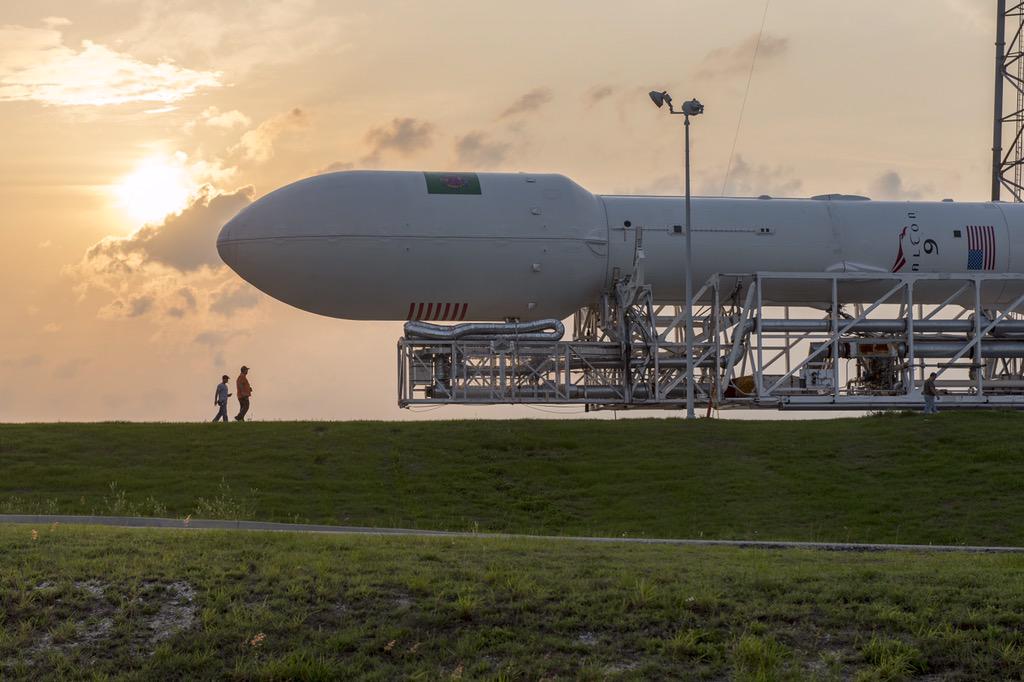
Russia’s Space Cooperation with Central Asia on Uncertain Path
Publication: Eurasia Daily Monitor Volume: 12 Issue: 108
By:

On April 27, Turkmenistan launched its first telecommunications satellite into space. The launch was hailed as a breakthrough by President Gurbanguly Berdimuhamedov, who watched the ceremony at Cape Canaveral in Florida live from Ashgabat via a conference call. The 4.5-ton satellite called TurkmenAlem52E/Monacosat was carried up to a geostationary orbit by a Falcon-9 rocket owned by US-Canadian billionaire Elon Musk’s SpaceX firm. The spacecraft had been constructed by a Franco-Italian joint venture, Thales Alenia Space, and is expected to serve for approximately 16 years before its planned decommissioning (Turkmeninform, April 29; Lenta, April 28).
The launch was initially scheduled for last November but had to be postponed several times for various technical reasons, the last attempt being in March 2015. Now that the satellite has finally been launched, it will stay at an altitude of over 36,000 kilometers above the Earth’s surface and provide constant coverage of more than 90 different countries in Europe, Africa and Central Asia. Earlier, in 2011, the Turkmenistani president decreed the establishment of the National Space Agency tasked with overseeing the development of the domestic “space industry.” The Agency’s director, Alladurdy Atayev, actually watched the rocket blast off from a National Aeronautics and Space Administration (NASA) facility in person, flanked by an impressive delegation of officials from Turkmenistan (NTV, CA-News, April 28; Infoabad, February 14).
Until recently, access to television and the Internet throughout Turkmenistan had been provided by a satellite called Yamal, which is operated by Gazprom Space Systems, a wholly owned subsidiary of the Russian state natural gas company. Since June, however, Turkmenistan’s National Space Agency has been in full control of the new satellite thanks to a team of 28 Turkmenistani engineers, all trained by Thales under a turnkey contract. The European contractor also hand-picked SpaceX to carry out the launch after US authorities had objected to the initial choice of a Chinese services provider, which would have sent the satellite into space from the Xichang Satellite Launch Center (XSLC) in southern China. Since the spacecraft contains a number of US-made components, it was judged at the time that Beijing’s participation could have been detrimental to the cause of intellectual property protection, as well as to Washington’s industrial counter-espionage efforts (Fergananews, April 28; Mir24 TV, September 24, 2013).
In Central Asia, Turkmenistan is the second country, after Kazakhstan, to have its own operational satellite. Back in June 2006, a Russian-built Proton-K rocket took off from the Baikonur Cosmodrome with the KazSat-1 satellite onboard. This Kazakhstani spacecraft had been designed by the Moscow-based Khrunichev Space Research and Production Center, in cooperation with Thales Alenia Space. Yet, despite initially successful results, communication with the spacecraft was permanently lost at the end of 2008 after a series of glitches. Two more telecommunications satellites, KazSat-2 and KazSat-3, were subsequently launched by Proton-type rockets, respectively in July 2011 and April 2014, in both cases without major incident (Dknews.kz, April 28, 2014; Profit.kz, July 18, 2011; Ktk.kz, November 28, 2008).
Unlike Turkmenistan, Kazakhstan remains firmly committed to long-term strategic space cooperation with Russia, which has been renting the Baikonur Cosmodrome since 1994. The Russian Federal Space Agency (Roscosmos) is now paying $115 million per year to lease the space launch facility. However, their relationship has been far from idyllic. In the fall of 2012, first reports emerged about Russia’s purported intention to substantially scale back future rocket launches from Baikonur. This would be broadly in line with Moscow’s official plans to transfer over time the bulk of its space operations to the new Vostochny Cosmodrome, currently under construction in the Far East Amur region (see EDM, October 24, 2012).
Amidst recurrent calls on behalf of some Kazakhstani policymakers to raise the rent fee for Baikonur’s facilities, Russia was visibly upset in December 2012 by a Kazcosmos-drafted schedule that reduced the number of planned starts from 17 to 12 by the end of 2013. At the time, it was argued that the nefarious environmental impact of Russian Proton rockets on Kazakhstan’s soil and water was the main rationale behind this unilateral move (see EDM, January 31, 2013). The lingering controversy was further compounded by the mid-2013 crash of a Proton-M carrier loaded with three Russian satellites. The incident led to the spill of some 600 tons of highly toxic fuel in southern Kazakhstan’s Kyzylorda province and sparked anti-Russian protests throughout the country (see EDM, September 30, 2013; Izvestia, July 19, 2013).
Yet, the biggest concern for the future of Russian-Kazakhstani space cooperation has been the project of a rocket launch complex called Baiterek at Baikonur—off to a good start in 2004 when it was approved but currently blocked by financial and technical uncertainties. Moscow’s reluctance to shoulder half of the project’s cost of $1.6 billion–$2 billion and its desire to use the new Angara rocket exclusively at the Vostochny and Plesetsk Cosmodromes, both on Russian territory, have been particularly problematic. While Kazakhstan subsequently decided to base the Baiterek project on Ukrainian-made Zenit carriers, the current crisis in Ukraine and Astana’s tacit support for Russia regarding the March 2014 annexation of Crimea have reduced this possibility to near-zero (Interfax, September 24, 2014).
As Baikonur was celebrating its 60th anniversary on June 2, 2015, Kazakhstani Deputy Prime Minister Bakytzhan Sagintayev and his Russian counterpart, Dmitry Rogozin, said that Baiterek’s construction was still on the table, but for not earlier than 2021—that is, 17 years after the initial agreement was signed (Kommersant, June 4). No financial particulars were revealed, however. According to their joint statement, the future facility would use the Angara rocket, which should replace all Proton-type rockets by 2025 (Lenta, June 6). Now that Turkmenistan is no longer paying for Gazprom’s satellite services, Kazakhstan may well be the next Central Asian country to actively start looking for a replacement to Roscosmos at Baikonur, especially given the increasingly uncertain fate of the Baiterek project.




